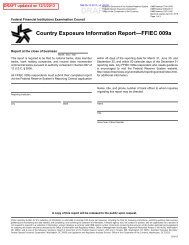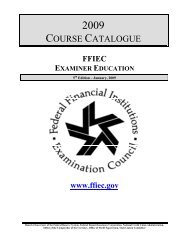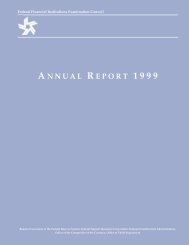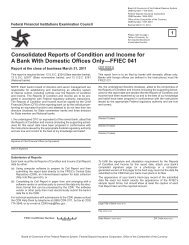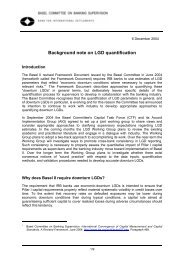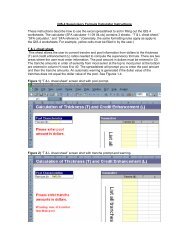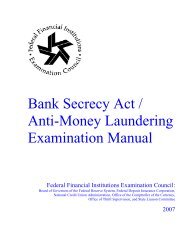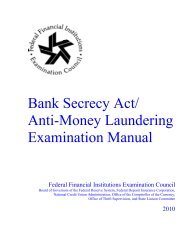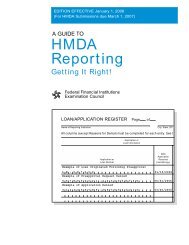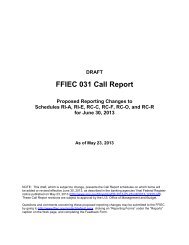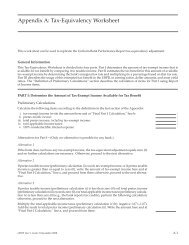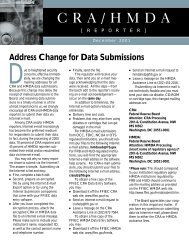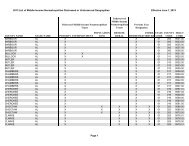Annual Report 2002 - ffiec
Annual Report 2002 - ffiec
Annual Report 2002 - ffiec
Create successful ePaper yourself
Turn your PDF publications into a flip-book with our unique Google optimized e-Paper software.
soundness implications of certain<br />
covenants included in some securitization<br />
documents. In December<br />
<strong>2002</strong>, the agencies issued additional<br />
guidance to clarify the appropriate<br />
accounting treatment for depository<br />
institutions that securitize credit<br />
card receivables and record an<br />
accrued interest receivable amount.<br />
Crisis Management Measures<br />
In response to the events of September<br />
ll, 2001, the Task Force on<br />
Supervision established a working<br />
group to update interagency emergency<br />
preparedness procedures and<br />
processes. During <strong>2002</strong>, as a result<br />
of this group’s efforts, the agencies<br />
updated their supervisory communication<br />
protocols to be used in<br />
emergencies. These protocols will<br />
be updated quarterly. They cover<br />
three general areas: communication<br />
among the banking agencies during<br />
emergencies; communication with<br />
regulated institutions; and coordination<br />
of communications with the<br />
public.<br />
Credit Card and Subprime Lending<br />
Monitoring and assessing the risks<br />
in subprime and credit card lending<br />
programs continued to be a major<br />
focus of the Task Force on Supervision<br />
in <strong>2002</strong>. The task force formed a<br />
working group to identify and coordinate<br />
on various accounting,<br />
policy, and examination issues<br />
related to assessing the risks in subprime<br />
and credit card lending programs.<br />
In response to some of the<br />
deficiencies examiners have found<br />
in credit card lending account management,<br />
risk management, and loss<br />
allowance practices, the FFIEC<br />
agencies developed and issued, for<br />
informal industry comment credit<br />
card account management and loss<br />
allowance guidance. The purpose<br />
of the guidance is to assist financial<br />
institutions in conducting credit<br />
card lending activities in a safe and<br />
sound manner, while meeting the<br />
needs of their customers. The guidance<br />
outlines the agencies’ expectations<br />
for prudent risk management,<br />
14<br />
income recognition, and loss allowance<br />
practices. The agencies issued<br />
the guidance in early January 2003.<br />
Corporate Governance and Audit<br />
During <strong>2002</strong>, the task force focused<br />
on the critical roles of effective corporate<br />
governance and audit procedures<br />
in the continued safe and<br />
sound operations of insured depository<br />
institutions. In December<br />
<strong>2002</strong>, the federal banking agencies<br />
approved a notice of proposed rulemaking<br />
that would strengthen their<br />
authorities to take disciplinary<br />
actions against independent public<br />
accountants and accounting firms<br />
that perform audit and attestation<br />
services required by section 36 of<br />
the Federal Deposit Insurance Act.<br />
The proposed rules would establish<br />
procedures under which the agencies<br />
could, for good cause, remove,<br />
suspend, or bar an accountant or<br />
firm from performing audit and<br />
attestation services for insured<br />
depository institutions with assets<br />
of $500 million or more. The agencies<br />
published the notice of proposed<br />
rulemaking for comment in<br />
early January 2003.<br />
An interagency working group<br />
that reports through the task force<br />
is in the process of reviewing the<br />
agencies’ policies and regulations<br />
pertaining to corporate governance<br />
standards to incorporate the applicable<br />
provisions of the Sarbanes-<br />
Oxley legislation and to determine<br />
if any additional actions are needed.<br />
Capital Standards<br />
Although each of the four federal<br />
banking agencies has its own capital<br />
regulations, the task force and<br />
several of its working groups coordinate<br />
efforts among the agencies to<br />
promote joint issuance of capital<br />
rules and related interpretative<br />
guidance, thereby minimizing interagency<br />
differences and reducing the<br />
potential burden on the banking<br />
industry. During <strong>2002</strong>, the federal<br />
banking agencies issued supervisory<br />
guidance to address the appro-<br />
priate capital treatment of certain<br />
asset securitization activities. (See<br />
‘Asset Securitization’ above.)<br />
Through the task force’s capital subcommittee,<br />
the agencies continue to<br />
work together to discuss and coordinate<br />
on complex capital rulings and<br />
interpretations. In April <strong>2002</strong>, the<br />
agencies lowered the risk weight for<br />
claims on certain qualifying securities<br />
firms. The subcommittee’s<br />
work also focused on various issues<br />
related to the proposed revisions to<br />
the Basel Capital Accord. The agencies<br />
will continue to coordinate<br />
Basel-related activities in 2003,<br />
emphasizing the various domestic<br />
supervisory, examination, and training<br />
efforts that would be needed<br />
to implement the proposed changes<br />
to the Accord. Concurrent with<br />
these efforts, the agencies are working<br />
to harmonize their regulatory<br />
formats.<br />
Information Technology<br />
The agencies continue to coordinate<br />
on issues related to information<br />
technology (IT). The Task Force on<br />
Supervision has a subcommittee<br />
that meets monthly to discuss and<br />
coordinate interagency policies,<br />
technology-related examination<br />
issues, and interagency examination<br />
procedures and to provide interagency<br />
IT training. In <strong>2002</strong>, the<br />
subcommittee continued to focus<br />
resources on a major project to<br />
update and revise the FFIEC’s 1996<br />
Information Systems Examination<br />
Handbook. The revised handbook<br />
will be issued as a series of webbased<br />
booklets that cover a range of<br />
topics. The first booklet, Information<br />
Security, was issued in January<br />
2003. The examination booklets on<br />
the supervision of technology service<br />
providers, business continuity<br />
planning, electronic banking and IT<br />
audit are expected to be issued in<br />
the first quarter of 2003. Work on<br />
remaining booklets that address<br />
payment systems, outsourcing, IT<br />
management, computer operations,<br />
and systems development and<br />
acquisition will continue throughout<br />
2003.



